Films with theme "L'enfance marginalisée", sorted by revenue
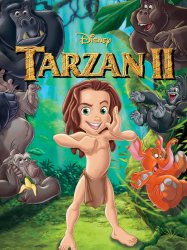
Tarzan II (2005)
, 1h14Origin USA
Genres Fantasy, Adventure, Animation
Themes Films set in Africa, Films about animals, Films about children, Le thème de l'enfant sauvage, Films about apes, L'enfance marginalisée, Musical films, Tarzan films, Children's films, Mise en scène d'un mammifère
Actors Harrison Chad, Glenn Close, Alfre Woodard, Lance Henriksen, Hamilton Camp, George Carlin
As a young human orphan being raised by gorillas in an African jungle, Tarzan (Harrison Chad) is worried that a fabled monster known as the Zugor (George Carlin) will someday attempt to capture him. He is disappointed that he can't run as quickly as the other young apes in his family, and his attempts to prove himself keep resulting in chaos. When an accident leaves his ape mother, Kala (Glenn Close), thinking that Tarzan has died, the other apes feel that Tarzan has reached a fitting end. Tarzan believes it best for everyone involved if he runs away.

Steak (2007)
, 1h20Directed by Quentin Dupieux
Origin France
Genres Science fiction, Comedy
Themes L'adolescence, Films about education, Films about children, Comedy science fiction films, Films set in the future, L'enfance marginalisée, Dystopian films, Films about school violence
Actors Éric Judor, Ramzy Bedia, Jonathan Lambert, Kavinsky, Laurent Nicolas, Alain Gendreau
Georges est le souffre-douleur de ses camarades de classe. Un jour, il craque et les mitraille. Son meilleur et seul ami Blaise est accusé à sa place et condamné à 7 ans d'internement dans un hôpital psychiatrique. Le jour de sa sortie, en 2016, Blaise n'a plus qu'une famille : son meilleur ami Georges. Mais ce dernier ne veut plus entendre parler de son ami d'enfance, car il essaie de s'intégrer aux « Chivers », une bande dont les membres portent un blouson rouge et des bottines, boivent du lait, roulent en sport truck et jouent à un jeu incompréhensible qui mélange cricket et calcul mental. Afin d'être définitivement admis par les Chivers, Georges doit cacher son tabagisme et se faire modifier le visage, car la chirurgie esthétique, qui fait des ravages parmi les jeunes, est un rite de passage obligé.

Achilles and the Tortoise (2008)
, 1h59Directed by Takeshi Kitano
Origin Japon
Genres Drama, Comedy, Comedy-drama
Themes Films about children, Peinture, L'enfance marginalisée
Actors Takeshi Kitano, Kanako Higuchi, Ren Osugi, Kumiko Asō, Akira Nakao, Nao Ōmori
Kitano plays Machisu, who is born into a wealthy family, but loses both his parents as a child. When his father (Akira Nakao) commits suicide after the collapse of his business, Machisu's stepmother (Mariko Tsutsui) sends him to live with an aunt and uncle who mistreat him and finally send him to an orphanage. As a young man, Machisu (Yurei Yanagi) attends art school and finds his style of painting challenged by the more experimental and conceptual work turned in by his classmates. Machisu takes a job in order to pay for art school, and strikes up a friendship with a fellow co-worker, Sachiko (Kumiko Aso), who seems to grasp his artistic vision. They get married and have a daughter. As he grows older, Mashisu's obsession with contemporary art controls his whole life, leaving him insensitive of everything around him, including the death of his own daughter (Eri Tokunaga) and his wife's desertion. He tries to please the art critics, remaining penniless. He is caught up in a fire and almost dies. Losing all his previous works, he is left with a single half-burnt soda can, which he assesses at 200,000 yen and tries to sell. This ends up kicked carelessly away when his wife picks him up from the street. They walk away together, seemingly finally rid of his artistic obsession.
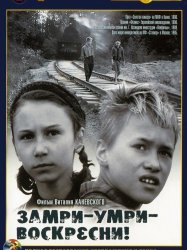
Freeze, Die, Come to Life (1990)
, 1h45Directed by Vitali Kanevski
Origin Russie
Genres Drama
Themes Films about children, L'enfance marginalisée
Actors Dinara Droukarova
En 1947, les amours tâtonnants de deux jeunes adolescents, une fille, Galia et Valerka un garçon. Ils vivent à Soutchan, petite ville minière d'Extrême-Orient à côté de laquelle se trouve un camp de prisonniers où il y a des détenus japonais. La vie y est dure et violente. Après avoir fait dérailler un train, Valerka part pour Vladivostok.

The Little Gangster (1990)
, 1h36Directed by Jacques Doillon
Origin France
Genres Drama
Themes Films about children, L'enfance marginalisée
Actors Richard Anconina, Gérald Thomassin, Clotilde Courau, Daniel Villanova
C'est l'histoire d'un jeune garçon appelé Marc. Il habite avec sa mère et son beau-père dans un appartement à Sète.

An Independent Life (1992)
, 1h35Directed by Vitali Kanevski
Origin Russie
Genres Drama
Themes Films about children, L'enfance marginalisée
Actors Dinara Droukarova
Ce film est la suite de Bouge pas, meurs, ressuscite, sorti en 1989 (le premier film de Vitali Kanevsky). Le héros, Valerka, sortant de l'adolescence, survit à Soutchan dans cette région orientale de la Sibérie à l’ère stalinienne où la civilisation semble n'être pas encore arrivée. Conditions de vie sauvage, extrême, pauvreté au delà de l'imaginable. Entre désespoir et rêve, c'est pourtant de cette vie moyenâgeuse que le réalisateur lui-même, comme un miracle, s'est échappé.
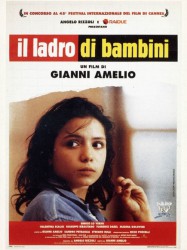
The Stolen Children (1992)
, 1h54Directed by Gianni Amelio
Origin Italie
Genres Drama
Themes Films about children, L'enfance marginalisée
Actors Enrico Lo Verso, Marina Golovine, Florence Darel, Renato Carpentieri
A policeman bonds with two children as he escorts them to an orphanage.
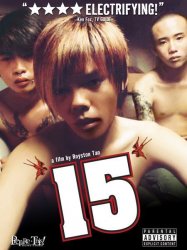
15 (2003)
, 1h30Directed by Royston Tan
Origin Singapore
Genres Drama, Comedy, Documentary, Crime
Themes L'adolescence, Films about children, Films about sexuality, La sexualité des mineurs, L'enfance marginalisée
The film stars three real-life juvenile gangsters, all aged 15, giving an accurate depiction of Chinese teenage gang-life in the Singapore suburbs. The 2003 film features two more gangsters as characters as well as a fight sequence with more affluent English-educated Singapore youths. Rather than scripting the movie or employing professional actors, Tan attempted to capture the troubled lives of his characters in realistic fashion, apparently without much prior scripting.
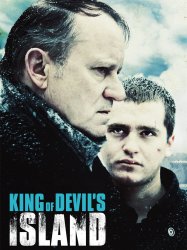
King of Devil's Island (2010)
, 1h55Directed by Marius Holst
Origin Norvege
Genres Drama, Action, Historical
Themes Films about children, Prison films, L'enfance marginalisée
Actors Stellan Skarsgård, Trond Nilssen, Kristoffer Joner, Ellen Dorrit Petersen
At the Bastøy prison for youths, the newest arrival, Erling "C19," soon becomes friends with Olav ("C1"). Under the rule of Håkon, Erling comes to terms with the harsh winter, the mistreatment by the staff, and the hated Housefather Bråthen. Later, Olav sees Bråthen molesting "C5", Ivar, a timid, shy boy in the laundry room. When he raises this with the Governor, the boys are severely punished and C5 is reassigned to duties far away from Bråthen. However, after hearing that Bråthen expects him to be back in the laundry room tomorrow Ivar drowns himself in the freezing Norwegian waters, while the rest of the boys are chopping wood. Bråthen is apparently fired, to the overwhelming delight of the other boys. Olav is paroled and is planning to leave, but on the way to the departing boat, walks past Bråthen, who had been sent away on a shopping trip until Olav, the only witness to Ivar's rape, had left Bastøy. Olav and Erling attack Bråthen and as punishment they are locked in the freezing solitary confinement. They are freed by Bjern, one of the few Bastøy boys who has remained on the island as a caretaker. Olav again pursues Bråthen, and the attack inspires a mass uprising. The boys ransack the prison, and drive away the staff. Bråthen is repeatedly hung and released and then beaten. The barn he is in is set ablaze, but Erling drags him to safety. The navy is brought in and violently puts down the uprising. Olav and Erling manage to escape across a frozen fjord back to the mainland, but Erling falls through a gap in the ice close to shore and quickly freezes to death.
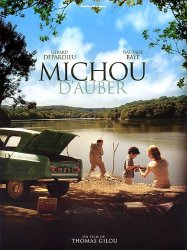
Michou d'Auber (2007)
, 2h4Directed by Thomas Gilou
Origin France
Genres Drama, Thriller, Comedy-drama
Themes L'adolescence, Films about adoption, Films about education, Films about children, Films about racism, L'enfance marginalisée, Films about school violence
Actors Gérard Depardieu, Nathalie Baye, Mathieu Amalric, Samy Seghir, Catherine Hiegel, Mohamed Fellag
En 1960, la guerre d'Algérie bat son plein. Le jeune Messaoud, 9 ans, orphelin de mère, est confié à une famille d'accueil établie dans le Berry, constituée de Gisèle et de Georges, bourru au grand cœur, tandis que son frère aîné poursuit un autre destin. Georges, facteur de son état, ancien combattant de la France Libre et de la guerre d'Indochine, un brin raciste, ne sait rien de la confession musulmane ni de l'origine algérienne du garçon que son épouse a rebaptisé « Michel » (ou « Michou ») d'Auber puisqu'il est né à Aubervilliers, et dont elle a décoloré les cheveux bruns. Michou découvre alors la France profonde.
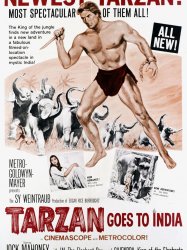
Tarzan Goes to India (1962)
, 1h28Directed by John Guillermin
Origin USA
Genres Action, Adventure
Themes Films set in Africa, Films about animals, Films about children, Le thème de l'enfant sauvage, Films about apes, L'enfance marginalisée, Tarzan films, Mise en scène d'un mammifère
Actors Jock Mahoney, Leo Gordon, Feroz Khan, Simi Garewal, Jagdish Raj
Tarzan is called to India to save three hundred elephants, that will be drowned if a dam is opened to create a man-made lake to power an electric plant. Tarzan is pitted against two engineers who ignore the catastrophic results their work will create.
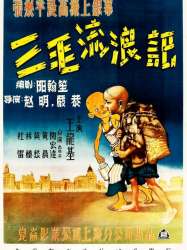
The Winter of Three Hairs (1949)
, 1h55Genres Drama, Comedy
Themes Films about children, L'enfance marginalisée
En 1948, à Shangaï, San Mao (trois poils en chinois) est un jeune orphelin livré à lui-même dans la rue comme de nombreux autre enfants miséreux à l'époque. Pour survivre il doit gagner sa vie en trouvant des petits boulots : ramasser les mégots, vendre des journaux, pousser les cyclo-pousse, mais la malchance semble s'acharner sur lui, rien ne marche vraiment et en plus la pègre locale le taxe sur le peu qu'il récupère. Seule la solidarité entre enfants des rues lui permet de s'en sortir.

The Giants (2011)
, 1h25Directed by Bouli Lanners
Origin Belgique
Genres Drama, Comedy-drama, Adventure
Themes Films about children, Medical-themed films, Films about drugs, L'enfance marginalisée
Actors Marthe Keller, Paul Bartel, Zacharie Chasseriaud, Karim Leklou, Gwen Berrou, Jean-François Wolff
Abandoned at their late grandfather's house for the summer, teenage brothers Zak and Seth are left to their own devices. With the endless possibilities of summer fun and adventure to be had in the idyllic Belgian countryside, they feel the world is their oyster. But when money runs short and with no help in sight, the boys scheme to support themselves by renting their deceased grandfather's house to a local drug dealer, but things don't go exactly as planned.

Tomorrow's Children (1976)
, 1h30Directed by Jean Pourtalé
Origin France
Genres Science fiction
Themes Films about children, Post-apocalyptic films, L'enfance marginalisée
Actors Niels Arestrup, Brigitte Roüan, Emmanuelle Béart
Ce film met en scène un monde post-apocalyptique où n'ont survécu que quelques rares personnes isolées qui se livrent entre elles à une lutte pour la vie. Philippe et sa femme sont dans une maison isolée à la campagne. Philippe cherche grâce à une radio à rejoindre un autre groupe de survivants, mais un jour des rôdeurs tuent sa femme.

Hell of Angels (1941)
, 1h36Directed by Christian-Jaque
Origin France
Genres Drama
Themes Films about children, L'enfance marginalisée
Actors Louise Carletti, Jean Claudio, Serge Grave, Marcel Mouloudji, Sylvia Bataille, Lucien Gallas
À la fin des années 1930, un drame de la misère se déroule dans un taudis. Battu régulièrement, un jeune garçon est finalement laissé pour mort par son père qui lui a donné un coup de fer à repasser. L'homme emporte le corps qu'il abandonne dans un terrain vague, mais quelque temps après, le garçon se réveille. Il erre dans la banlieue parisienne, il a perdu la mémoire et ne se souvient même plus de son prénom.
 Connection
Connection